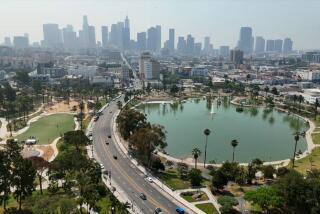Cart Drivers Take to the Streets : Golfers Win Right to Cross Roadways on Way to Greens
- Share via
Almost every morning when the dew is still on the greens, the intrepid golfer revs up his electric-powered golf cart and putters down the neighborhood streets of La Costa to the boulevard that separates his home from his home away from home--the community golf course.
At the thoroughfare, he looks both ways for cars and for the local traffic cop. If the coast is clear, he makes a snail’s version of a dash across the boulevard to the pro shop and the first tee. If a police car is about, he makes a U-turn and heads back home for a second cup of coffee before making another try at the boulevard crossing.
“I feel like a border jumper,” said the retiree, who lives the distance of a Jack Nicklaus drive from his beloved golf course--and who is nervous enough about his illegal crossings to insist that his name not be published. “I feel like I have a right to cross that street. But if I get caught, it means a fine somewhere around $100.”
Before Jan. 1, all jaunts like his were illegal. Under state law, golf carts were forbidden to venture onto any public street where the speed limit was greater than 25 m.p.h., not even to cross at a crosswalk.
But at the beginning of the year, a new law went into effect that allows the poky vehicles to cross streets with speed limits up to 45 m.p.h., but only at specific sites approved by local officials.
The new law is just part of the new respect being given to tortoise-slow golf carts in California. One Southern California desert community has installed cartways along the sides of its streets instead of sidewalks or bike paths.
And Palm Desert is planning an experiment with a veritable road system of golf-cart paths that would take drivers from library to supermarket to fairway and home again.
Even Berkeley, no golfer’s capital, is interested in the idea. The small, easy-to-park, sometimes electric-driven carts are seen as a potentially less-polluting mode of transportation ideally suited to city life.
For the hundreds and perhaps thousands of avid golfers around the state who now have a green light to drive their carts to the course--no one knows exactly how many carts there are because owners are not required to license them--credit goes to state Assemblywoman Tricia Hunter (R-Escondido) and to a bunch of determined golfers in San Diego County who egged her on.
Golfers in San Diego Country Estates near rustic Ramona were the first to feel the sting of the decades-old section of the state health and safety code that kept golf carts off all but the slow-speed streets.
“It started about three years ago when some guy’s son got a ticket for riding a dirt bike on the street,” golfer Michael Craig said. “So the old man decided that it was time that golf carts obeyed the law, too.”
The California Highway Patrol began issuing tickets--$50 to $80 a shot--to carts that crossed San Vicente Road, which lies across the path to the golf course. Craig has avoided the CHP officers by taking a roundabout detour to the course, driving his cart up hill and down dale, past the horse barn and down the bridle path that eventually reaches the golf course.
CHP officials would not bow to the golfers’ protests that they were only doing what they had done safely for years. So the golfers went to Assemblywoman Hunter, and now the CHP already has approved legal crossing spots on San Vicente Road, which will be marked with golf-cart crossing signs.
“It may seem like a minor matter, whether a person can take his cart to the course or has to carry his clubs, but most of the golfers out here are retired and came here to play golf,” said Fred Stoner, general manager of the Country Estates Homeowners Assn.
CHP Officer Rocky Rockwell, who played a role in approving the crossing spots, said the new law should present no problems.
“These cart drivers are mostly retired people who are careful, not kids tearing around,” he said.
At Rancho Santa Fe’s elite golf course, players must to break the law twice to finish an 18-hole round, and have been doing so for 40 years without being bothered by the law. On Jan. 17, Oceanside CHP office Cmdr. Ron Phulp approved golf-cart crossings across Avenida de Acacias, which bisects the course.
So far, golf-cart crossings in Country Estates, Fallbrook and Rancho Santa Fe have been approved. CHP officials in Temecula also approved a cart crossing at Mountain Meadows.
Some golf communities can evade the complicated approval process because their streets are designated as private, not public, rights-of-way. Other courses are designed so that surrounding homes all have access to the greens without crossing higher-speed streets.
Shadowridge, a massive, planned community in the southern part of Vista, resolved its own golf-cart problems with the help of city traffic authorities before the state Legislature acted on the Hunter bill.
David Shell, former manager at the Shadowridge club, said that a cooperative Vista traffic safety commission and city officials agreed to install a four-way stop sign to allow golf carts to cross Shadowridge Drive.
“This is a community designed around the golf course,” Shell said.
But in the La Costa area of Carlsbad, golfers are still stymied in their cart-commuting.
For one thing, several streets leading from the residential neighborhoods to major arterials around the course have no posted speeds. Under the state’s “basic speed limit” provisions, autos may travel at any safe and reasonable speed. Therefore, carts cannot use the unposted streets.
While carts will be allowed to cross streets at approved sites, they still cannot travel down higher-speed roads.
The city has not approved any crossing sites yet, so the nervous boulevard jumper’s daily crossings remain illegal. And, La Costa Avenue, which cuts half the community off from the golf courses, “is a 45 m.p.h. street, and I can’t see any way that golf carts can cross it safely,” said Carlsbad police Capt. George Suttle.
Bob Johnson, city traffic engineer, held out some hope for the La Costa cart commuters, including the nervous retiree who braves the crossing each morning.
Johnson’s staff is now evaluating the unposted streets with an eye to erecting speed limits on them. Those streets that rate a 25 m.p.h. limit will be opened to golf-cart commuters.
Golf-cart owners also take heart from the experience of Rancho Mirage, a desert community near Palm Springs where golfing is almost a religion.
Parts of Rancho Mirage have no sidewalks, said Carlos Melendez, city engineering technician. Instead, they have cartways.
Golfers can commute from home to course, crossing streets at designated sites and using the cartways. Cartways also connect the Las Palmas neighborhood with a neighborhood shopping center, Melendez said. The city helps to pay for the construction and upkeep of the cartways with $10 a year permits sold to cart owners.
“It all started a few years ago when one gentleman persisted in driving his cart down Highway 111. That highway has about 36,000 cars a day going down it,” Melendez said. “We did this in order to save some lives.”
Palm Desert, which claims the title of “golf capital of the world,” has carried the golf-cart experiment even further, city environmental conservation manager John Wohlmuth said. Golf carts are so popular in Palm Desert that many homes have separate mini-garages to house them. The Coachella Valley, where the community is located, has 90,000 golf carts.
Legislation now wending its way through Sacramento will allow Palm Desert to set up a five-year test of dedicated cartways throughout the city, linking not only golf courses but libraries, schools, shopping centers, churches, parks and community centers to the residential neighborhoods of the city.
Wohlmuth said the city already has spent about $20,000 on a cartway plan that shows marked golf-cart paths honeycombing the city. If and when the Legislature approves AB 1229, the city will spend about $200,000 to install the cartways.
The cartway experiment has drawn queries from La Costa and Country Estates, the Orange County community of Laguna Hills and from as far away as Berkeley, Wohlmuth said.
In the view of Country Estates’ golfer Craig, the world is finally according golf carts their due.
“They allow ladies with baby buggies, skateboarders, joggers, pedestrians, bicycles, and everybody else on the road,” Craig said. “Everybody but us.
“This is the sort of thing we dumped the tea in Boston Harbor for.”
More to Read
Go beyond the scoreboard
Get the latest on L.A.'s teams in the daily Sports Report newsletter.
You may occasionally receive promotional content from the Los Angeles Times.










